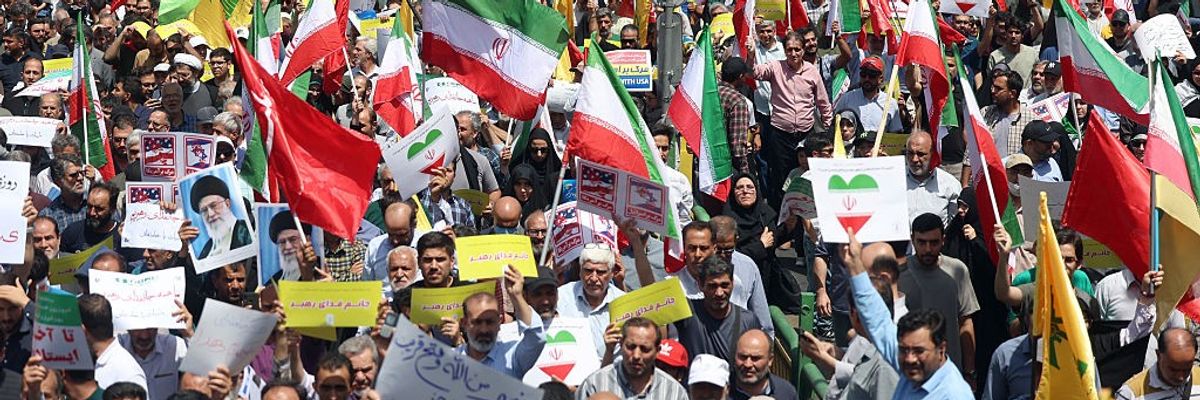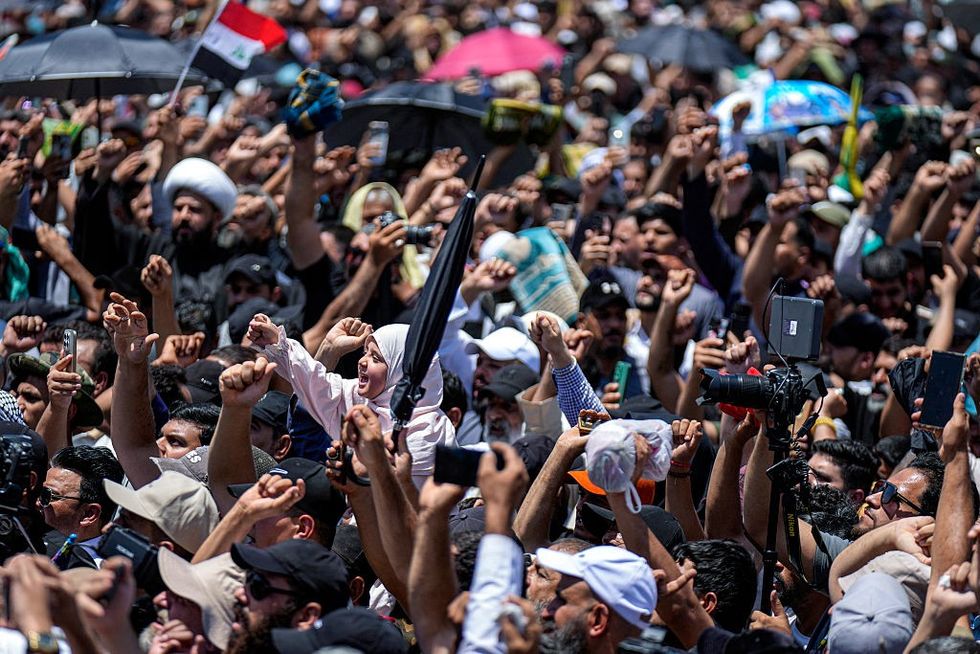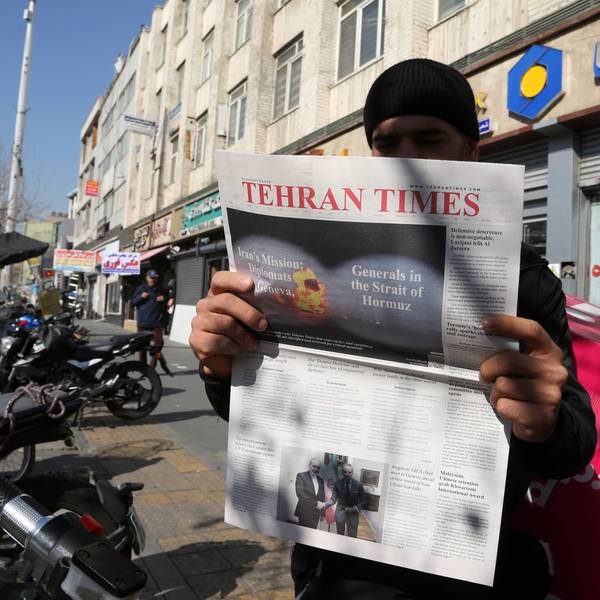
Iranians protest Israeli attacks in Tehran on June 20, 2025.
Hundreds of Thousands March Against US-Backed Israeli Aggression in Tehran
"Since day one of these strikes, we've seen this strong sense of anger from ordinary citizens. Now they're taking to the streets to express that."
Hundreds of thousands of people took to the streets of Tehran and other cities across Iran on Friday to protest Israel's illegal and escalating assault as the U.S.—Israel's top ally and arms supplier—considers entering the war, which killed or wounded more than 2,600 Iranians during its first week.
Reporting from Tehran, Al Jazeera's Tohid Asadi called Friday's demonstrations "unprecedentedly large."
"We have to keep in mind that a considerable proportion of Tehran's population has decided to get out of the city amid the attacks, but still we see huge numbers," said Asadi. "Since day one of these strikes, we've seen this strong sense of anger from ordinary citizens. Now they're taking to the streets to express that."
🪧 People gathered across Iran, including capital Tehran, during Friday prayers to protest against Israeli attacks
Iranians chanted anti-Israel and anti-US slogans, expressing their support for the Iranian government ⤵️ pic.twitter.com/X4X5hhYe5c
— Anadolu English (@anadoluagency) June 20, 2025
Protests also broke out in the capitals of Iraq and Lebanon as Israel and Iran traded missile strikes, and Iran's foreign minister, Abbas Araghchi, arrived in Geneva for talks with European Union and United Kingdom officials.
In an interview ahead of the talks, Araghchi called the United States "a partner in this crime" and said that Iran is unwilling to engage in negotiations "until this aggression stops."
Citing an unnamed senior Iranian official, Reuters reported that Iran "was ready to discuss limitations on uranium enrichment but that any proposal for zero enrichment—not being able to enrich uranium at all—would be rejected, 'especially now under Israel's strikes.'"

The mass demonstrations came as U.S. President Donald Trump weighed options—including the use of a nuclear weapon—to directly join Israel's attack on Iran. The White House said Thursday that a final decision from the president will come within two weeks.
Ryan Costello, policy director at the National Iranian American Council, said in a statement Friday that "the use of nuclear weapons to prevent the mere possibility of nuclear weapons is not strategy—it is a waking nightmare."
"A nuclear strike would massacre Iranians indiscriminately and unleash devastating radioactive fallout across Iran and the region, spreading terror, panic, and irreversible harm," said Costello. "We should never have come to this point. But we are here. And we must raise our voices, urgently, against Netanyahu's war of aggression and the warmongers cheering it on. The path forward is diplomacy, not devastation. We must shut this Pandora’s box before more horrors are unleashed."
An Urgent Message From Our Co-Founder
Dear Common Dreams reader, The U.S. is on a fast track to authoritarianism like nothing I've ever seen. Meanwhile, corporate news outlets are utterly capitulating to Trump, twisting their coverage to avoid drawing his ire while lining up to stuff cash in his pockets. That's why I believe that Common Dreams is doing the best and most consequential reporting that we've ever done. Our small but mighty team is a progressive reporting powerhouse, covering the news every day that the corporate media never will. Our mission has always been simple: To inform. To inspire. And to ignite change for the common good. Now here's the key piece that I want all our readers to understand: None of this would be possible without your financial support. That's not just some fundraising cliche. It's the absolute and literal truth. We don't accept corporate advertising and never will. We don't have a paywall because we don't think people should be blocked from critical news based on their ability to pay. Everything we do is funded by the donations of readers like you. Will you donate now to help power the nonprofit, independent reporting of Common Dreams? Thank you for being a vital member of our community. Together, we can keep independent journalism alive when it’s needed most. - Craig Brown, Co-founder |
Hundreds of thousands of people took to the streets of Tehran and other cities across Iran on Friday to protest Israel's illegal and escalating assault as the U.S.—Israel's top ally and arms supplier—considers entering the war, which killed or wounded more than 2,600 Iranians during its first week.
Reporting from Tehran, Al Jazeera's Tohid Asadi called Friday's demonstrations "unprecedentedly large."
"We have to keep in mind that a considerable proportion of Tehran's population has decided to get out of the city amid the attacks, but still we see huge numbers," said Asadi. "Since day one of these strikes, we've seen this strong sense of anger from ordinary citizens. Now they're taking to the streets to express that."
🪧 People gathered across Iran, including capital Tehran, during Friday prayers to protest against Israeli attacks
Iranians chanted anti-Israel and anti-US slogans, expressing their support for the Iranian government ⤵️ pic.twitter.com/X4X5hhYe5c
— Anadolu English (@anadoluagency) June 20, 2025
Protests also broke out in the capitals of Iraq and Lebanon as Israel and Iran traded missile strikes, and Iran's foreign minister, Abbas Araghchi, arrived in Geneva for talks with European Union and United Kingdom officials.
In an interview ahead of the talks, Araghchi called the United States "a partner in this crime" and said that Iran is unwilling to engage in negotiations "until this aggression stops."
Citing an unnamed senior Iranian official, Reuters reported that Iran "was ready to discuss limitations on uranium enrichment but that any proposal for zero enrichment—not being able to enrich uranium at all—would be rejected, 'especially now under Israel's strikes.'"

The mass demonstrations came as U.S. President Donald Trump weighed options—including the use of a nuclear weapon—to directly join Israel's attack on Iran. The White House said Thursday that a final decision from the president will come within two weeks.
Ryan Costello, policy director at the National Iranian American Council, said in a statement Friday that "the use of nuclear weapons to prevent the mere possibility of nuclear weapons is not strategy—it is a waking nightmare."
"A nuclear strike would massacre Iranians indiscriminately and unleash devastating radioactive fallout across Iran and the region, spreading terror, panic, and irreversible harm," said Costello. "We should never have come to this point. But we are here. And we must raise our voices, urgently, against Netanyahu's war of aggression and the warmongers cheering it on. The path forward is diplomacy, not devastation. We must shut this Pandora’s box before more horrors are unleashed."
Hundreds of thousands of people took to the streets of Tehran and other cities across Iran on Friday to protest Israel's illegal and escalating assault as the U.S.—Israel's top ally and arms supplier—considers entering the war, which killed or wounded more than 2,600 Iranians during its first week.
Reporting from Tehran, Al Jazeera's Tohid Asadi called Friday's demonstrations "unprecedentedly large."
"We have to keep in mind that a considerable proportion of Tehran's population has decided to get out of the city amid the attacks, but still we see huge numbers," said Asadi. "Since day one of these strikes, we've seen this strong sense of anger from ordinary citizens. Now they're taking to the streets to express that."
🪧 People gathered across Iran, including capital Tehran, during Friday prayers to protest against Israeli attacks
Iranians chanted anti-Israel and anti-US slogans, expressing their support for the Iranian government ⤵️ pic.twitter.com/X4X5hhYe5c
— Anadolu English (@anadoluagency) June 20, 2025
Protests also broke out in the capitals of Iraq and Lebanon as Israel and Iran traded missile strikes, and Iran's foreign minister, Abbas Araghchi, arrived in Geneva for talks with European Union and United Kingdom officials.
In an interview ahead of the talks, Araghchi called the United States "a partner in this crime" and said that Iran is unwilling to engage in negotiations "until this aggression stops."
Citing an unnamed senior Iranian official, Reuters reported that Iran "was ready to discuss limitations on uranium enrichment but that any proposal for zero enrichment—not being able to enrich uranium at all—would be rejected, 'especially now under Israel's strikes.'"

The mass demonstrations came as U.S. President Donald Trump weighed options—including the use of a nuclear weapon—to directly join Israel's attack on Iran. The White House said Thursday that a final decision from the president will come within two weeks.
Ryan Costello, policy director at the National Iranian American Council, said in a statement Friday that "the use of nuclear weapons to prevent the mere possibility of nuclear weapons is not strategy—it is a waking nightmare."
"A nuclear strike would massacre Iranians indiscriminately and unleash devastating radioactive fallout across Iran and the region, spreading terror, panic, and irreversible harm," said Costello. "We should never have come to this point. But we are here. And we must raise our voices, urgently, against Netanyahu's war of aggression and the warmongers cheering it on. The path forward is diplomacy, not devastation. We must shut this Pandora’s box before more horrors are unleashed."

